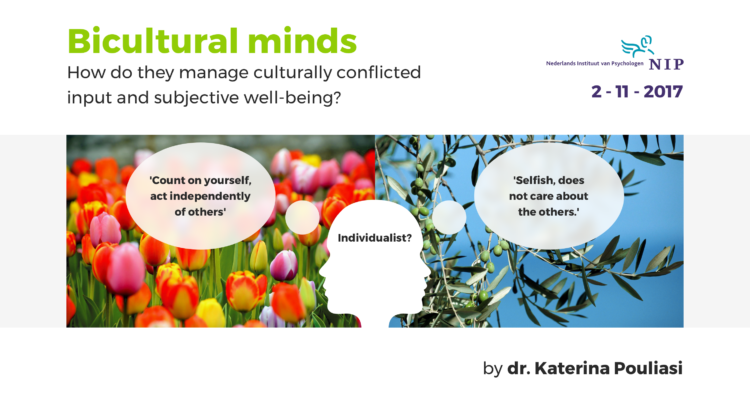Title of presentation:
Bicultural minds: How do they manage culturally conflicted situations and subjective well-being?
at NIP upcoming symposium:
When culture matters:
The contribution of cross-cultural studies to the development of psychology as a science.
Utrecht, the Netherlands / 2 November, 2017
Abstract
When you live actively with more than one culture you may, partly unconsciously, partly deliberately, acquire a ‘bicultural mind’. Katerina Pouliasi has investigated how children and adults who are constantly immersed in two cultures (in their own family, organizations, society at large or even in cross-national professional interactions) are able to develop a bicultural mind: i.e. have the ability to think and behave in ways that fit the patterns of either culture depending on the salient context. In her experimental studies she uses typical cultural symbols and the language connected to these symbols to activate each culture’s input on targeted domains, like aspects of the Self, endorsement of values, cognition in social behaviour and even on how associations are culturally networked. A critical principle is that conflicting input rooted in different cultures cannot simultaneously guide cognition and behaviour. Cultural Conflict between one’s origin and host culture plays critical role in this process and her findings with the Dutch as host culture, are consistent to other studies with the American as host culture.
Most important for psychologists, the contributions of a positive ‘I’ feeling to subjective well-being, taken for granted for the Dutch, can be less effective than that of a strong ‘We’ feeling for people with a collectivistic background.
Short Bio
Katerina Pouliasi obtained her Ph.D on ‘Culture, Self-Understanding and the Bicultural Mind’ at the University of Utrecht (2010). Since then, she conducts tailor-made surveys and workshops on how different cultures influence the ‘ideal’ self, values, well-being, self-esteem, understanding of certain ‘words’. Next to cross-cultural factors, she employs cultural priming techniques to elicit spontaneous behaviour in shifting the cultural context. She provides training and consultancy for multinational companies on Cross-Cultural Management, and for expats, international students and Dutch interested in intercultural competence in private and/or professional settings.
Program
13.30- Doors open
13.45- 14.00 Drs. Cristina Vellinga MRes: Introduction
14.00-14.40 Prof. dr. Ype Poortinga: Migrants and their culture: background or identity?
14.40-15.20 Dr. Katerina Pouliasi: Bicultural minds: how do they manage culturally conflicted situations and subjective well-being?
15.20-15.30 break
15.30-16.10 Dr. Rens van de Schoot: Shouldn’t we stop testing null hypotheses and using p- values?
16.10-16.50 Dr. Victor Kouratovsky: Culture gets under your skin. Over the relationship between culture and development (phylogenesis and ontogenesis), examined from the perspective of the new domain of cultural neurosciences
16.50- 17.00 break
17.00- 17.40 Dr. Hanneke Bot: Why transcultural health care may be a wrong idea?
17.40- 18.20 Prof. dr. Fons J.R. van de Vijver: Effects of policies on the integration of migrants
18.20-19.00 break (warm meals)
19.00-20.00 Debate Psychology 2.0 (chair: Dr. Jeroen Knipscheer; special guests: prof. dr. Rolf Kleber (Univ. Utrecht), drs. Polli Hagenaars (EFPA Human Rights), Dipl. Psych. Ulrike del Ponte (EFPA Cultural and Ethnic Diversity)
Location: De Koepelzaal in Het Huis, Utrecht, Boorstraat 107, see here on the Map

